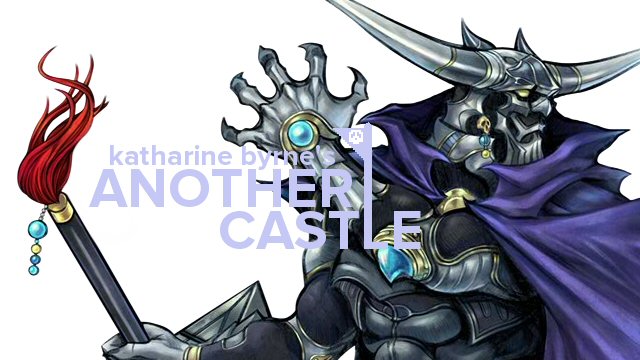
I’ve been playing a lot of Theatrhythm Final Fantasy lately, and I’ve loved every second of it. From the art style and the music to its charming, nonsensical humour, everything about it just fills me with joy, and if I didn’t already have an itch to replay Final Fantasy VIII, IX and X, I certainly do now. But one thing I love above all else in Theatrhythm are the battle sequences where you get to tap and slide your stylus along to your favourite Final Fantasy battle tunes. With classics like VII’s “One-Winged Angel” and IV’s “Battle with the Four Fiends” on the playlist, these are easily my favourite challenges in the entire game.
But as my party of four came up against the likes of Kefka, Jenova and Sephiroth over and over again, I began thinking back to the days when “the big bads”, as I used to refer to them, were first revealed in their respective games. Some ultimate bosses made complete sense– Sephiroth, Sin, even Zemus from Final Fantasy IV— but others completely flummoxed me. I mean, seriously, where on earth did Necron come from in Final Fantasy IX? Perhaps I wasn’t paying enough attention at the time, or perhaps my memory’s getting poor in my old age, but Necron’s sudden and unexplained appearance left a lasting impression on Final Fantasy IX and it’s precisely the reason why I don’t remember it as fondly as, say, Final Fantasy IV or VIII. I’m all for last second plot twists, but for me this was just one plot twist too far from where I was sitting ten odd years ago.
But it’s not just Final Fantasy which has tried this trick over the years. Star Fox Adventures, The Legend of Zelda: Ocarina of Time, The World Ends with You, even the newly released Heroes of Ruin— all of them pull a switcheroo on their final villain right at the last minute. Yet, in my mind, at least, nearly all of them are more successful at it than our old pal Necron in Final Fantasy IX, so what’s their secret? Why can some games reveal their “big bad” out of nowhere while others leave us dazed and confused about what’s just happened?
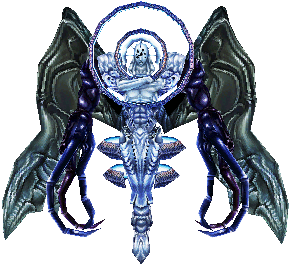 Let’s start by looking at this whole Necron business. Right at the end of Final Fantasy IX, you’re all geared up to fight Kuja, the guy who’s been causing you trouble since the start of the game. Earlier you had problems with Queen Brahne, later you had problems with Garland, but Kuja’s always been the constant villain. There’s no one else who could possibly upstage him at this point, so you go in and fight the hardest battle of the entire game so far.
Let’s start by looking at this whole Necron business. Right at the end of Final Fantasy IX, you’re all geared up to fight Kuja, the guy who’s been causing you trouble since the start of the game. Earlier you had problems with Queen Brahne, later you had problems with Garland, but Kuja’s always been the constant villain. There’s no one else who could possibly upstage him at this point, so you go in and fight the hardest battle of the entire game so far.
As you deal the final blow, Kuja despairs and vows that if he’s going to die, then he’s damn well going to take everyone else into the next life with him, and the next thing you know he’s cast Ultima and destroyed both himself and your entire party. The screen fades to white and questions start flooding in. Did I win? Did I die? What just happened? Eventually it cuts back to your devastated party and a triumphant but weary Zidane is trying to pick himself back up after the brutal attack. As he pulls himself to his feet, the rest of your party start coming round too, and you think you must have won, that victory can only be a few minutes away. But then that eerie music kicks in and a mysterious voice brings everything to a halt.
At this point we have no idea who or what this voice is. Is it Kuja? “Wh-Who are you!?” Zidane asks for us, but we don’t get an answer. Instead, the voice goes on to wax philosophical about how pitiable it is that humans fear death, even though death is something we carry with us from the moment we’re born. Kuja’s actions, it says, are undeniable proof that all things live to perish, and it comes to the conclusion that the world must therefore be reset in order to cure this fear of death. Of course, Zidane’s not having any of this, so he and his friends rally their strength for one last fight. But rather than dwell on what Necron says, I think what Zidane asks during this scene pretty much sums up my feelings about his appearance:
Why are you telling me all this?
What do you mean by that!?
Who the hell do you think you are!?
This is really what irritates me about Necron– we never get any answers to Zidane’s questions. His existence is never really explained during the course of those final moments– we don’t even learn his name until we get to the actual battle itself– and we’re left with a big, unsatisfying question mark over how he fits into the overall story and why we’re having to endure yet another boss battle. It seems like he’s just there for the sake of another plot twist, another fight, but I don’t think either of these are good enough reasons to just introduce a character. Of course, it didn’t help that the first time I tried to beat him he completely wiped out my party within a few turns because I didn’t equip any of them with ribbons, but that’s a story for another day.
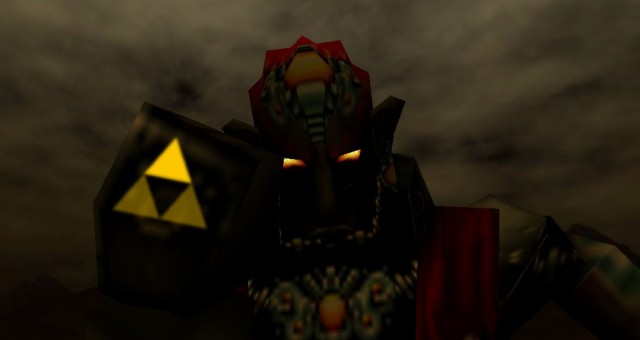
Holy shhhhhhh-ugar plum fairies on a stick! He’s still alive!
By way of contrast, let’s think back to the final moments of The Legend of Zelda: Ocarina of Time. You’ve just beaten Ganondorf, survived the collapse of his castle, and then BAM. He transforms into Ganon, and you suddenly have another fight on your hands. Of course, this may have been a bit of a no-brainer given Ganondorf’s name, but I think the same logic still applies. No mention of Ganon has been made until now, so why should anyone, especially new fans, expect Ganon to appear?
Yet even if old fans saw this coming a mile off, the revelation of Ganon makes much more sense than that of Necron because players don’t really need to know who Ganon is in order to understand his significance to the story. As Ganondorf bursts through the wreckage, he’s angry. REAL angry. His heavy, gasping breath cuts everything as he hovers above Link and Zelda, and his narrowed, glowing eyes are full of rage– the only thing he’s got left is his Triforce of Power, so in one final bid to beat this runt of a hero and his princess, he evolves (or rather devolves) into a fitting symbol of his greed and desperation: a hulking great pig that can no longer speak or voice its desires. He can’t even claim to be the “pitiful man” Zelda spoke of only a few moments ago on top of the tower, and the shortening of his name reflects this loss of humanity. Yet in spite of all this, he’s even more dangerous than before as he’s gained the power to reduce us right back to the child we were at the beginning of the game. When he knocks the Master Sword from our hands, it doesn’t matter that we don’t know who Ganon is– it’s about reminding us that even after all the strength we’ve gained over the course of the game, we’re still just a ten year old boy at the end of it all, and Ganon’s transformation helps reveal all this to the player. Necron, on the other hand, does… well, he doesn’t do anything like that at all.
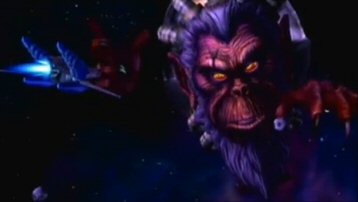 Of course, sometimes a last minute boss reveal can just feel plain lazy by comparison, like Andross in Star Fox Adventures. We were all set to fight General Scales, but then a weird voice crashes the party and demands that Scales hands over the final Krazoa Spirit we need to save Krystal. With Scales dealt with and Krystal revived, it seems like our final foe will be the giant head of a Krazoa god, but no, it’s just Andross. Again.
Of course, sometimes a last minute boss reveal can just feel plain lazy by comparison, like Andross in Star Fox Adventures. We were all set to fight General Scales, but then a weird voice crashes the party and demands that Scales hands over the final Krazoa Spirit we need to save Krystal. With Scales dealt with and Krystal revived, it seems like our final foe will be the giant head of a Krazoa god, but no, it’s just Andross. Again.
I must admit I was a little disappointed when I first saw him– it felt like a weak imitation of Star Fox 64; as if it had to remind us that “Hey, this really is a proper Star Fox game, honest!”– but putting its aped ending aside for a moment, at least Andross isn’t another Necron. He may lack the symbolism of a villain like Ganon, but Star Fox Adventures does, in fact, prepare the player for his arrival, even for franchise newcomers. When General Scales gives up the Krazoa Spirit, for example, Fox comments on how Andross’ voice seems familiar, and just before the actual battle, Andross declares how much he’s been looking forward to meeting Fox again, implying that there’s some kind of history between them right from the get go. It’s not much, but it’s definitely a whole lot more than we get with Necron.
I think my favourite kind of big bad reveal, though, are the ones like we see in The World Ends with You, when your final adversary ends up being someone you’ve known about for almost the entire game. In TWEwY‘s case, it establishes early on that the Reapers will be the game’s primary antagonists, but the identity of their leader, The Composer, is never made clear until the very end. This not only maintains the game’s suspense, but when it does finally reveal that The Composer has been Joshua, one of Neku’s three main companions, all along, it also makes the pay-off incredibly satisfying as it answers all the questions we’ve been asking ourselves over the course of the game. It also helps us understand more of Neku’s story as well, but more importantly it makes sense within the course of the game. Necron, meanwhile, just… appears and demands players make sense of him themselves.
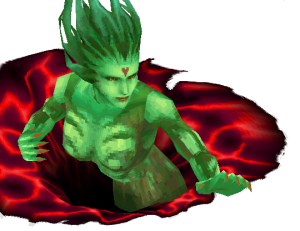 But perhaps I’m being a bit harsh on Necron. After all, Final Fantasy IX was a kind of homage to every Final Fantasy game that had come before it, so maybe I should really be blaming Final Fantasy III, whose final boss was the equally inexplicable Cloud of Darkness. Much like Necron, the Cloud of Darkness appears just after Xande, III‘s main antagonist, bites the dust, declaring that the world must be reset to a state of nothingness. Sound familiar?
But perhaps I’m being a bit harsh on Necron. After all, Final Fantasy IX was a kind of homage to every Final Fantasy game that had come before it, so maybe I should really be blaming Final Fantasy III, whose final boss was the equally inexplicable Cloud of Darkness. Much like Necron, the Cloud of Darkness appears just after Xande, III‘s main antagonist, bites the dust, declaring that the world must be reset to a state of nothingness. Sound familiar?
Yet even the Cloud of Darkness trumps Necron because just like all the other boss reveals I’ve mentioned above, her appearance still makes sense within the context of the story. By draining the Earth and Water Crystals of their power, Xande upset the natural order of good and evil and ended up summoning a tide of darkness into the world as a result. Unsurprisingly, this is where the Cloud of Darkness comes from, so despite having still effectively appeared out of nowhere, her plot twist is infinitely more plausible than Necron’s as she actually gets tied into the surrounding narrative. The battle with Necron, on the other hand, takes place in a completely unique location– the Hill of Despair– and we’re never told how he relates to Kuja or the Crystal World he’s just destroyed. He’s just there without any obvious reason or purpose, and I think it’s this lack of significance to the plot which really lets Final Fantasy IX down.
Of course, not every big bad reveal is going to be perfect, but since video games have such a strong tendency to reveal just one more villain during their final moments, I think they should try to at least answer Zidane’s questions when they do. I realise that not every game character can have a hugely intricate back-stories– though it might make the lives of NPC townsfolk way more interesting if they did!– but I think bosses have a special significance when it comes to games. These are the obstacles you’ve been trying to overcome for the entire game, after all, and their story is often just as important to the main plot as the protagonist’s journey. With Kuja, for instance, it was about him coming to terms with his own mortality, having been created by Garland to cause death and destruction from the moment of his birth. Defeating him is all part of his tragedy as a villain, but then Necron shows up and completely ruins that moment of catharsis. In the end, if we can’t figure out who they are, why they’re here, what they’re after or even where they’ve come from, then what’s the point? Why ruin your story with an extra, meaningless villain just for the sake of it? Here’s hoping that we’ll see less Necron’s in the future when it comes to last minute boss revelations, because one Necron is quite enough for me, thank you!




 ShareThis
ShareThis






